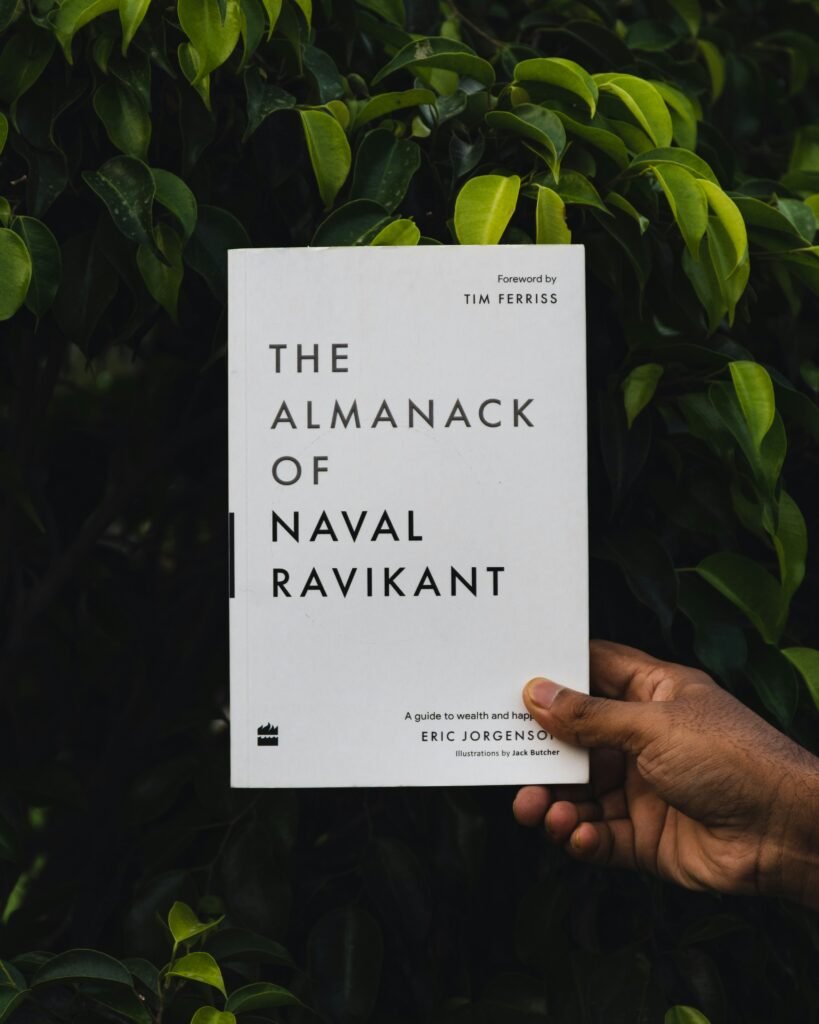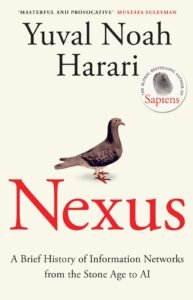Learning and unlearning are dynamic processes that drive personal growth. Embracing new knowledge challenges outdated beliefs, while unlearning outdated practices clears the path for innovative thinking. This fluid exchange helps us adapt, stay relevant, and continuously evolve, reflecting the ever-changing nature of our understanding and skills.

Best Quotes from the Almanack of Naval Ravikant
Best Quotes from the Almanack of Naval Ravikant
- “The three big ones in life are wealth, health, and happiness. We pursue them in that order, but their importance is reverse.”
- “Happiness is being satisfied with what you have.”
- “It’s only after you’re bored you have the great ideas. It’s never going to be when you’re stressed, or busy, running around or rushed.”
- “No one in the world is going to beat you at being you.”
- “Desire is a contract you make with yourself to be unhappy until you get what you want.”
- “Retirement is when you stop sacrificing today for an imaginary tomorrow. When today is complete, in and of itself, you’re retired.”
- “A happy person isn’t someone who’s happy all the time. It’s someone who effortlessly interprets events in such a way that they don’t lose their innate peace..
- “Earn with your mind, not your time.”
- “Escape competition through authenticity.”
- “Doctors won’t make you healthy. Nutritionists won’t make you slim. Teachers won’t make you smart. Gurus won’t make you calm. Mentors won’t make you rich. Trainers won’t make you fit. Ultimately, you have to take responsibility. Save yourself.”

Top 10 Key Insights from the Book "Nudge"
Humans Ain’t Always the Sharpest Tools in the ShedForget the idea of the “perfectly rational man,” for folks often make decisions as if guided by a map drawn in crayon. Instead of cold logic, they’re swayed by gut feelings, whims, and the crowd’s clamor.A Gentle Nudge Can Steer Folks RightA nudge, now, is like a subtle prod that shifts a person’s course without slamming the door on other options or changing their pocketbook’s weight. It’s a way to nudge them towards the better path without shackling their freedom.The Default Setting Packs a PunchThe “default option” is what you get when you don’t make a move. These defaults can nudge folks toward the better choice—like signing them up for a retirement plan without a fuss. It’s a sly way of setting them on the right track.Keeping Up with the Joneses is a Strong SpurPeople are mighty influenced by what their neighbors are up to. Letting folks know what their peers are doing can be a powerful nudge to encourage good habits, like saving energy or putting pennies in the piggy bank.Feedback is the Breakfast of Behavior ChangeWhen folks get a quick snapshot of the fallout from their actions, they’re more likely to choose wisely. Like those fancy meters that show real-time energy use—seeing the numbers can make folks think twice about how much they’re burning through.The Way You Spin It Matters a HeapThe manner in which choices are laid out can tip the scales. Presenting the same facts in different lights—like spotlighting gains versus losses—can lead folks to choose one way over another.Temptation Bundling Can Rein in the ImpulsePairing a guilty pleasure with a good-for-you activity can help keep those urges in check. For example, letting yourself indulge in a favorite show only while you’re on the treadmill.Libertarian Paternalism—A Balancing ActThis fancy term means nudging folks toward better decisions while still letting them have their say. It’s about guiding them with a gentle hand while keeping the door open for them to walk away if they choose.Nudges Have a Wide ReachThe art of nudging isn’t just for one thing—it can smooth the way in health, wealth, education, the environment, and even personal matters. It’s a universal key to unlocking better choices.Nudges Can Backfire if You’re Not CarefulThough nudges can be powerful, they need to be crafted with a touch of finesse. A poorly thought-out nudge can lead to unexpected messes or come off as a sneaky trick, rather than a helpful hand.In short, *Nudge* lays out a fine roadmap for how a gentle push in the right direction can help folks make smarter choices. By embracing these principles, we can nudge people towards better decisions while still letting them steer their own course. |
"Unlocking the Core Insights
from
yuval Noah Harari's
'Nexus'"

Unraveling the Web: How Humans Became Super Smart with Information Networks
It starts with early humans sharing stories around campfires to help their groups survive. Then, it explains how the invention of writing allowed people to record and pass on knowledge. The invention of the printing press made books more accessible, spreading ideas faster. Mass media like radio, TV, and newspapers helped people get news and shape opinions. Today, the internet lets people access information instantly, but it can also be overwhelming, with both true and false information. The post also talks about how robots and artificial intelligence might change information networks in the future and the importance of media literacy to help us navigate the information overload responsibly.
Once upon a time, a long, long time ago, humans didn’t have phones, computers, or even books! But guess what they did have? Information networks! These are like invisible webs of knowledge that humans have been using since they lived in caves. Let’s take a trip through time and see how these networks made us super smart.
How Cavemen Shared Stories
A long time ago, early humans would sit around the fire and share stories. These stories weren’t just for fun—they helped people learn about the best places to hunt, what plants were safe to eat, and even how to avoid dangerous animals. These information networks helped groups stick together and survive in the wild!
From Talking to Writing: The Magic of Books
At first, humans only passed information through talking. But one day, someone came up with a clever idea: writing things down! This was a game-changer. Instead of forgetting important stuff, people could now write it down on stone, clay, and later, paper! Imagine not having to remember everything but having a book to look it up. Cool, right? It made it easier to teach others and create rules for society.
The Super-Powerful Printing Press
Fast forward a few centuries, and humans invented the printing press. This machine could make hundreds of copies of a book super fast. Before this, books were very rare, and only a few people had them. But now, lots of people could learn to read, share ideas, and discover new things. It’s like when you share a funny meme with your friends—only these ideas could change the whole world!
Radio, TV, and Newspapers Take Over
Then came the era of mass media! People no longer had to wait for someone to tell them stories face-to-face. With newspapers, radios, and later televisions, they could get the latest news right in their homes. Imagine listening to your favorite music or watching cartoons after school. This new way of spreading information helped shape people’s opinions and even how they voted for leaders.
The Internet: The Superpower of Today
Now we’re in the age of the internet, where you can search for almost anything in seconds! Want to know the fastest animal on Earth? Google it! Need help with homework? There are tons of videos and articles online. But there’s a catch—the internet is so big that sometimes it’s hard to tell what’s true or false. And that’s why we have to be careful and use our brains to figure out what’s real.
Robots and AI: The Future of Information
Have you ever heard of robots or artificial intelligence (AI)? These are machines that are super smart and can learn things on their own. One day, they might help us even more with organizing information. But we also have to be careful because we don’t want robots controlling everything!
Who Controls the Web?
There’s another thing to think about—who controls all this information? Imagine if only one person or company could decide what everyone gets to see or learn. That could be a problem, right? We need to make sure information is fair and open to everyone, so no one has too much control.
Too Much Information, Not Enough Time!
Here’s a funny thing: even though we have all this amazing information, sometimes there’s just too much! It’s like trying to drink water from a firehose—it’s hard to take it all in. So, we need to learn how to figure out what’s important and what’s just junk. That’s why learning how to think critically and being a good “information detective” is so important today!
Here are 10 world bestselling books of all time based on estimated copies sold globally. These books have transcended cultures and generations:
- “Don Quixote” by Miguel de Cervantes
- Estimated Copies Sold: 500 million
- A classic novel about a man who becomes obsessed with chivalric ideals.
- “A Tale of Two Cities” by Charles Dickens
- Estimated Copies Sold: 200 million
- A historical novel set during the French Revolution.
- “The Lord of the Rings” by J.R.R. Tolkien
- Estimated Copies Sold: 150 million
- An epic fantasy trilogy following Frodo Baggins on a quest to destroy the One Ring.
- “The Little Prince” by Antoine de Saint-Exupéry
- Estimated Copies Sold: 140 million
- A philosophical and poetic story of a young prince traveling the universe.
- “Harry Potter and the Sorcerer’s Stone” by J.K. Rowling
- Estimated Copies Sold: 120 million
- The first book in the Harry Potter series that launched a global phenomenon.
- “The Hobbit” by J.R.R. Tolkien
- Estimated Copies Sold: 100 million
- A prequel to The Lord of the Rings, following Bilbo Baggins’ adventures.
- “And Then There Were None” by Agatha Christie
- Estimated Copies Sold: 100 million
- A thrilling mystery novel where ten strangers are mysteriously killed off one by one.
- “Dream of the Red Chamber” by Cao Xueqin
- Estimated Copies Sold: 100 million
- A classic Chinese novel exploring life and society during the Qing dynasty.
- “The Da Vinci Code” by Dan Brown
- Estimated Copies Sold: 80 million
- A modern thriller combining art, history, and conspiracy theories.
- “The Alchemist” by Paulo Coelho
- Estimated Copies Sold: 65 million
- A philosophical tale about following one’s dreams and destiny.

